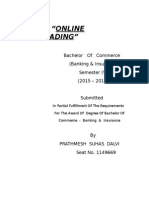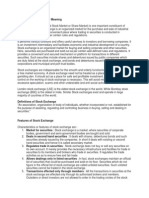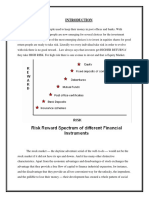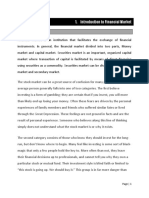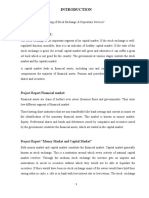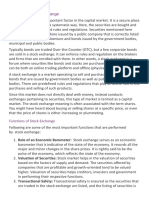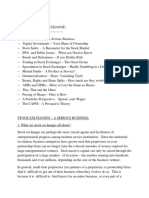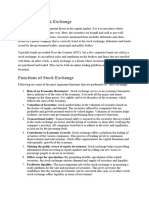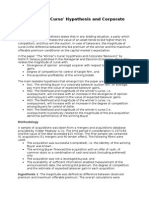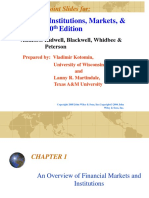Online Trading
Online Trading
Uploaded by
prathmesh dalviCopyright:
Available Formats
Online Trading
Online Trading
Uploaded by
prathmesh dalviOriginal Description:
Copyright
Available Formats
Share this document
Did you find this document useful?
Is this content inappropriate?
Copyright:
Available Formats
Online Trading
Online Trading
Uploaded by
prathmesh dalviCopyright:
Available Formats
1
Introduction to the
capital market:The capital market is the market for securities, where companies
and the government can raise long term funds. The capital market includes
the stock market and the bond market. Financial regulators ensure that
investors are protected against fraud. The capital markets consist of the
primary market, where new issues are distributed to investors, and the
secondary market, where existing securities are traded.
Capital market thus plays a vital role in channelizing the savings of
individuals for Investment in the economic development of the country. As a
result the investors are not constrained by their individual abilities, but by
the abilities of the companies, which in turn enhance the savings and
investments in the country, liquidity of capital market is an important factor
affecting growth.
Since projects require long term finance, but on the other hand, the
investor may not like to relinquish control over their savings for a long time.
A liquid stock market ensures a quick exit without incurring heavy losses or
costs. Thus development of efficient market system is necessary for creating
conductive climate for investment and economic growth.
Capital market Segment:Primary & Secondary
Broadly , the comprises of two segments the new issue market
which is commonly known as primary market and the stock market which is
known as secondary market.
Primary:A primary offering, such as with a corporate bond, means you are
buying it directly from the issuer, at par value, usually. A secondary market
is where you sell or buy existing issues. I.E. If you bought a bond last year,
now need to get your principal, you can sell it in the secondary market. You
may not get par value. If rates are up since you bought the bond, then you
will likely have to sell it at a discount to be able to get rid of it. If rates have
fallen since you bought it, you could get a premium for it.
Secondary:The market where securities are traded after they are initially
offered in the primary market. Most trading is done in the secondary market.
To explain further, it is trading in previously issued financial instruments. An
organized market for used securities. Bombay Stock Exchange (BSE),
National Stock Exchange NSE, bond markets, over-the-counter markets,
residential mortgage loans, governmental guaranteed loans etc
Secondary Market refers to a market where securities are traded
after being initially offered to the public in the primary market and/or list on
the Stock Exchange. Majority of the trading is done in the secondary market.
INDIAN CAPITAL MARKET AT GLANCE
21st century:-
2000
Depositories came into existence (electronic form of
shares)
2001
Ketan Parekh scam
2002
Start of rolling settlement and banning of Badla trading
2002
Introduction of T+3 settlement in April
2003
Introduction of T+2 settlement in April
2005
BSE Senses touches all time high 6954 in January
2006
BSE Senses touches all time high 12500,the highest
intraday fall of 1100
2007
BSE reaches the level of
2008
BSE touches all time high in January 2008
2008
Sense saw its highest ever loss of 1,408 points at the end
of the session.
2008
Sexes saw its 15 month low, from its all time high
2009
Sexes saw its down trend & highest ever loss because of
Satyam case.
BRIEF ABOUT THE STOCK EXCHANGE:Stock Exchange is a market like any other centralized market
where both buyers and sellers come and conduct their business of purchase
and sale of shares & securities. In other words, it is a market place for shares
and securities where trading takes place in a controlled and protected
environment.
MEANING OF STOCK EXCHANGE
A stock exchange, share market or bourse is a corporation or
mutual organization which provides "trading" facilities for stock brokers and
traders, to trade stocks and other securities. Stock exchanges also provide
facilities for the issue and redemption of securities as well as other financial
instruments and capital events including the payment of income and
dividends. The securities traded on a stock exchange include: shares issued
by companies, unit trusts and other pooled investment products and bonds.
To be able to trade a security on a certain stock exchange, it has to be listed
there. Usually there is a central location at least for recordkeeping, but trade
is less and less linked to such a physical place, as modern markets are
electronic networks, which gives them advantages of speed and cost of
transactions. Trade on an exchange is by members only. The initial offering
of stocks and bonds to investors is by definition done in the primary market
and subsequent trading is done in the secondary market. A stock exchange is
often the most important component of a stock market. Supply and demand
in stock markets is driven by various factors which, as in all free markets,
affect the price of stocks (see stock valuation).
CONCEPT OF SHARE TRADING ;-
The concept of share broking emerged after the establishment of
the joint stock companies. The ownership of the companies was divided into
small parts and that every part was called share. So, the term Share
denominates some part in the ownership of the company. The shares are
freely transferable subject to the some certain restrictions. When the need
was felt to sell the shares by the owner of the shares, it was difficult to find
out the buyers of the shares who want to buy the shares at the price the seller
want to sell. At that time a need was felt to bring the buyers and sellers on a
common platform. To solve this problem, a group of persons came into
picture, which used to bring the buyers and sellers together for the trade of
the shares. These persons are called the share Brokers who find the persons
who wish to buy or sell their securities. The whole process of finding the
buyers and sellers of the securities by the brokers is called the Share
Broking.
The origination of the Indian securities market may be traced back
to 1975, when 22 enterprise brokers under a Banyan tree established the
Bombay Stock Exchange (BSE). Over the last 130 years, the Indian
securities market has evolved continuously to become one of the most
dynamic, modern international standards both in terms of structure and in
terms of operating efficiency.
Functions of Stock Exchange:-
Stock exchange is established into the main purpose of providing a
market place for the members to deal in securities under well laid down
regulations and to protect the interest of the investors. The main functions of
stock exchange are:1. It brings the companies and investors together so that the investors
can put risk capital into companies and thus, companies can use the
capital.
2. It provides an orderly regulated market for securities.
3. It provides continuous, ready and open market for selling and buying
securities.
4. It promotes savings and investment in the economy by attracting
funds from the investors.
5. It facilitates take overs by means of acquiring majority of shares
traded on the stock market.
6. It acts as a clearing house of business information.
7. It motivates the managers of well reputed companies, to retain their
shares in A group, to improve performance.
8. It induces the managers to improve performance for converting nonspecified shares into specified shares in the exchange.
9. It enables the investors to evaluate the net worth of their holdings.
10.It also allows the companies to float their shares in the market.
On Line Trading
Meaning of Online Trading:Change is the law of nature. There were times when man was a
wanderer or a normal. He himself had to go place to place in search of food,
water and now everything is available at your doorstep just at the click of the
mouse. The growth of information technology has affected almost all sectors
of life. Internet has enabled us to get every information at our doorstep.
When Internet has affected all sectors he could stock markets the most
important player of the economy, has remained far behind? Like all other
sectors Internet has set its feet in the stock markets also.
Internet trading commissions are clearly posted on the websites of
the various services, and are typically a fixed rate charge, depending upon
the type of security being traded and the size of trade. In theory, therefore, an
Interest investor always knows what commission he is being charged on
each trade. Internet investors can take as much time as they would like to
take prior to placing a trade order. Similarly the online investor likely does
not have to worry that his broker is making unauthorized trades. Since there
is no individual broker making a commission, the only person who is
authorized to trace in a the account is the actual investor. Furthermore, the
internet investor can never become a victim of excessive trading (where for
the broker) since the investor maintains total control over the number of
transactions which take place in the account.
All of these positive features of internet trading may lead the
unwary investor to believe that Internet trading is a way to take control of
their finances and save more money in the process. Unfortunately, this is not
always the case.
First and foremost, the average investor is not an expert in the
financial markets. There is a danger for allowing the autonomy of
online trading to hull you into the belief that you are an expert
investor. An online investor sitting at home at a personal computer
also foregoes proper investment advice and financial planning,
perhaps among the most valuable services provided by traditional
brokers.
There are, of course, additional risks relative to performing
transactions over the Internet especially on a shared computer. Those
people whom investors have provided their account number and
password can freely trade that account while the investor will have
little, if any, resource against the brokerage firm for the breach of
security.
When was online trading introduced in INDIA?
Online trading started in India in February 2000 when a couple
of brokers started offering an online trading platform for their customers.
ONLINE TRADING BY NSE & BSE
The central computer located at the Exchange is connected to the
workstations of the Brokers through satellite using Very Small Aperture
Terminals (VSATs). Orders placed at the Brokers' workstations reach the
central computer and are matched by the computer based on price and time
priority.
Both the exchanges have switched over from the open outcry
trading system to a fully automated computerized mode of trading known as
BOLT (BSE On Line Trading) and NEAT (National Exchange Automated
Trading) System. It facilitates more efficient processing, automatic order
matching, faster execution of trades and transparency. The scrips traded on
the BSE have been classified into 'A', 'B1', 'B2', 'C', 'F' and 'Z' groups. The
'A' group shares represent those, which are in the carry forward system
(Badla). The 'F' group represents the debt market (fixed income securities)
segment. The 'Z' group scrips are the blacklisted companies. The 'C' group
covers the odd lot securities in 'A', 'B1' & 'B2' groups and Rights
renunciations. key regulator governing Stock Exchanges, Brokers,
Depositories, Depository participants, Mutual Funds, FIIs and other
participants in Indian secondary and primary market is the Securities and
Exchange Board of India (SEBI) Ltd.
DIFFERENCE BETWEEN ONLINE AND OFFLINE
TRADING :-
10
Nevertheless, with all the convenience of online trading there are
still investors who prefer the old fashion way of offline trading. Offline
trading has lost some popularity but it is still the main form of investing.
Offline trading offers many benefits as well.
1. The one benefit that an investor appreciates the most is that they are not
alone when making investment decisions.
2. There are experienced and professional brokerage companies that handle
their investments for them.
3. Investors are not faced with the challenge of making these vital
investment decisions; especially, if they do not have the experience
necessary to make the appropriate investments.
4. Also, there is someone there to answer any questions that may cause
concerns. Not to mention, with offline trading mistakes are less likely to take
place. No one wants to throw their money away or stand by and watch
someone else throw their money away. It may be wise to hire a professional
to assist you in making the correct investment decisions if you feel you lack
the knowledge necessary.
Points of difference between online trading and offline
trading are as follows:
1. Online trading is very expensive as compare to manual trading or offline
trading.
11
2. Online trading consumes less time as compare to manual trading.
3. Online trading has very helpful to finding the records easily but offline
trading takes more time to finding the records.
4. In the help of online trading, there is no chance of any errors while doing
the trading. in offline trading there are some errors exist like barriers of
communication .
5. With the help of online trading, we know the international market rate of
share very easily.
DEMATERIALISATION OF SHARES
Dematerialization is the process wherein shares certificates or
other securities held in physical form are converted into electronic form and
credited to demat account of an investor opened with a depository
participant. SEBI has made compulsory trading of shares of all the
companies listed in stock exchanges in demat form with effect from 2 nd
January 2002.The procedure of opening a demat account with DP is similar
to opening an account with a bank.
12
ELECTRONIC SETTLEMENT OF TRADE
A. Procedure for purchasing dematerialized securities:
The procedure for purchasing dematerialized securities is also similar
to the procedure for buying physical securities.
Investor instructs DP to receive credits into his account in the
prescribed form.
There may be one time standing instruction or separate instruction each
time to receive credits.
Investor purchases securities in any of the stock exchanges linked to
depository through a broker.
Broker receives payment from investor and arranges payment to
clearing corporation.
Broker receives credit to securities in clearing account on the payout
day.Broker gives instructions to DP to debit clearing account .
B. Procedure of selling dematerialized securities :
The procedure for selling dematerialized securities in stock exchanges is
similar as selling physical securities. The only major difference is that
instead of delivering physical securities to the broker, the investor instructs
his DP to debit his demat account with the number of securities sold by him
and credit the brokers clearing account. The procedure for selling
dematerialized securities is given below:
13
Investor sells securities in any of the stock exchange linked to depository
through a broker.
Investor instructs his DP to debit his demat account with the number of
securities sold and credit the brokers clearing account.
Before the pay-in-day, broker of the investor transfers the securities to
clearing corporation.
The broker receives payment from the stock exchange.
The investor receives payment from the broker for sale of securities in the
same manner as received in case of sale of physical securities.
REMATERILISATION OF SHARES
Rematerialization is the process of conversion of electronic holdings of
securities into physical certificate form. For rematerilisation of scrips, the
investor has to fill up a remat request form (RRF) and submit it to the DP.
The DP forwards the request to depository after verifying the investors
balances. Depository in turn initiates the registrars and transfer agent or the
issuer company. RTA/ Company prints the certificates and dispatches the
same to the investor.
14
Market timings:
Trading on the derivatives segment takes place on all days of the week
(except Saturdays and Sundays and holidays declared by the Exchange in
advance). The market timings of the derivatives segment are:
Normal Market / Exercise Market Open time
hours
Normal market close
hours
Set up cut of time for Position limit/Collateral value
hrs
Trade modification end time / Exercise Market
hours
: 09:55
: 15:30
: till 15:30
: 16:15
Advent of online trading
The history of e-trading goes back to 1983, when a doctor in Michigan
placed the first online trade using E*TRADE technology. what began with a
single click over 16 years ago has now taken the world by storm. The
concept was visualized by one bill porter, a physicist and inventor with more
than dozen of patents to his credit, who provided online quotes and trading
services to fidelity, Charles Schwab, and quick and Reilly. This led bill to
wonder why, as an individual investor, he had to pay a broker hundreds of
dollars for stock transactions. with incredible foresight, he saw the solution
at hand, some day everyone would own computers and invest through them
15
with unprecedented efficiency and control. And today his dream has become
a reality.
16
Internet Based Trading through Order Routing
Systems
Internet based trading on conventional exchanges, uses the Internet as a medium
for communicating client orders to the exchange, through broker web sites.
Brokers web sites may serve a variety of functions. These may include;
Allowing the clients to directly trade through investors;
Advertise the broker dealers services to potential investors;
Offer market information and investment tools similar to those offered by
information vendor or SRO web sites;
Offer real-time or delayed quote information, continuously update quotes while the
user visits other sites, or allow investors to create a personal stock ticker;
Provide market summaries and commentaries, analyst reports and trading
strategies and market data on currencies, mutual funds, options, market indices and
news; and
Offer investors access to portfolio management tools and analytic programs;
Information on commission and fees; and
Account information and research reports.
In an Order Routing system, a broker offering Internet trading facility provides an
electronic template for the customer to enter the name of the security, whatever it is
to be bought or sold, the quantity and whatever the order is a market or limit order.
Once the brokers system receives this information.
17
Use of Internet as Alternative Trading Systems (Provision
for price discovery and matching outside conventional
exchanges)
In foreign jurisdiction, Alternative trading systems have been developing outside
conventional securities markets, which provide investors with additional
proprietary electronic trading facilities for securities that are traded principally on
securities exchanges, or other organized markets. They have price discovery
functions, matching systems and crossing systems. The systems that are currently
in use in outside jurisdictions are closed systems and are not accessible to the
general public through the Internet. The securities markets regulators abroad the
maintained flexible and open policies designed to encourage innovation in the
secondary securities markets. As a result, a number of market participants, usually
broker-dealers, have developed computerized alternative trading systems by
which the system centralize, display, match, cross or otherwise execute trading
interest.
Use of Internet for making Initial Public Offerings
Issues of securities of using the Internet to communicate directly with their
shareholders, potential investors and analysts by disseminating corporate
information. In foreign jurisdiction, they are also using the Internet to
communicate to the public for the following:
Public offerings;
Private offerings; and
Disclosure and communication
Issuers are using the Internet to market themselves to potential investors. The
Internet is also being used for fulfilling necessary disclosure requirements, for
disseminating the prospects in electronics form and even for receiving share
applications in public issues electronically. In India, SEBI has taken initiative in
18
permitting use of the network of stock exchange for collection of investor
applications in public offerings by the issuer companies.
Investment Advisory Services
Brokers as well as other service provides such as investment firms, research outfits
etc. are using the Internet for marketing and advertising purposes, for presenting
information on portfolio analysis and market information, and for communicating
with and receiving orders from potential investors. The services offered by the
service providers to the investors are generally the following:
Advertising
Providing investment information and investment advice
Underwriting
Communicating with the investors;
Customer orders; and
Record keeping
Working Groups set up by the Committee
19
Considering the present state of capital markets in India and keeping in view the
ongoing developments in Internet based securities business, it was felt that SEBI as
a regulator could strive to identify areas where use of Internet in the capital market
is possible within the existing legal framework. One such area identified by the
Committee, which is also the central within the existing legal framework. One such
area identified by the Committee, which is also the central theme of this report, is
the area of Internet trading on existing electronic exchange. In this area, through
early introduction of Cyber Laws would be highly describe but their existence is
not a necessary precondition. To look into the existing regulatory scenario and to
bring out some ground rules for use of the medium of Internet, the Committee
therefore constituted the following two working groups to look into the area of:
Security protocols and standardization of interfaces for Interest based securities
trading, chaired by Prof. Deepak B. Phatak, IIT, Pawai, Mumbai
Surveillance and monitoring related issues arising due to Interest based securities
trading, chaired by Shri. L.K. Singhvi, Sr. ED, SEBI
The committee also requested Ms D N Raval, Executive Director, SEBI to examine
the legality of introduction of Internet trading and issue of Alternative trading
systems. This report of the standing committee examines the regulatory and
security requirements Internet Based Trading on Conventional Exchanges.
Separate reports (s) will cover the other areas related to Internet applications in the
securities markets.
The report of the first working group on security protocols and standardization of
interfaces has since been submitted and incorporated in the report. The committee
would like to place on record its sincere thanks to Dr. D.B. Phatak, Ms. D.N. Raval
and their team members. The global financial market is undergoing a
transformation due to rapid technological developments. It thus becomes
imperative that for developing in effective regulatory framework developments in
other parts of the world should be studies and analyzed.
With nearly who million on-line investors, Internet trading in the United States is
growing by leaps and bounds. Internet trading is being facilitated by large
brokerage houses, thus changing the total concept of securities trading. A team
20
comprising of members from stock exchanges and SEBI visited the United states
to these development and had interactions with brokerages houses, Internet service
providers and other agencies involved in facilitating Internet trading. The team also
discussed the developments in the emerging regulatory and supervisory framework
in United States with the Securities and Exchange Commission officials. They
were also tripped of the various initiatives taken by SEC in this regard. These
inputs have been utilized while drafting this report.
Recommendations of the Committee
Application for Permission by Brokers
SEBI registered Stock Brokers interested in providing Internet based trading
services will be required to apply to the respective stock exchange for a formal
permission. The stock exchange should grant approval or reject the application as
the case may be, and communicate its decisions to the number within 30 calendar
days of the date of completed application submitted to the exchange. The stock
exchange, before giving permission to brokers to start Internet based services shall
ensure the fulfillment of the following minimum conditions.
Net worth Requirement
The broker must have a minimum net worth of Rs. 50 lacs if the broker is
providing the Internet based facility on his own. However, if some brokers
collectively approach a service provider for providing the interest trading facility,
net worth, criteria as stipulated by the stock exchange will apply. The net worth
will be computed as per the SEBI circular no FITTC/DC/CIR-1/98 dated June 16,
1998.
Operational and System Requirements:
Operational Integrity:
21
The stock Exchange must ensure that the system used by the broker has provision
for security, reliability and confidentiality of data through use of encryption
technology. This stock exchange must also ensure that records encryption
technology. The stock Exchange must also ensure the records maintained in
electronic from by the broker are not susceptible to manipulation.
System Capacity
The stock Exchange must ensure that the brokers maintain adequate backup
systems and data storage capacity. The stock Exchange must also ensure that the
workers have adequate system capacity for handling data transfer, and arranged for
alternative means of communications in case of Internet link failure.
Qualified Personnel:
The stock Exchange must lay down the minimum qualification fro personnel to
ensure that the broker has suitably qualified and adequate personnel to handle
communication including instructions as well as other back office work which is
likely to increase because of higher volumes.
Written Procedures:
Stock Exchange must develop uniform written procedures to handle contingency
situations and for review of incoming and outgoing electronic correspondence.
Signature Verification/ Authentication:
It is desirable that participants use authentication technologies. For this purpose is
should be mandatory for participants to use certification agencies as and when
notified by Government/SEBI. They should also clearly specify when manual
signatures would be required.
Client Broker Relationship
1. Know Your Client:
22
The stock Exchange must ensure that brokers have sufficient, verifiable
information about clients, which would facilitate risk evaluation of clients.
2. Broker- Client Agreement:
Brokers must enter into an agreement with clients spelling out all obligations and
rights. This agreement should also inter alia, the minimum service standards to be
maintained by the broker for such service specified by SEBI/Exchange for the
internet based trading from time to time. Exchange will prepare a model agreement
for this purpose. The broker agreement with clients should not have any clause that
is less stringent/contrary to the conditions stipulated is the model agreement.
3. Investor Information:
The broker web site providing the internet based trading facility should contain
information meant for investor protection such as rules and regulations affecting
client broker relationship arbitration rules, investor protection rules etc. The broker
web site providing the Internet based trading facility should also provide and
display prominently, hyper link to the web site/page on the web site of the relevant
stock exchange (s) displaying rules/ regulations/ circulars. Ticker/quote/order book
displayed on the web-site of the broker should display the time stamp as well as
source of such information against the given information.
4. Order/Trade Confirmation:
Order/Trade confirmation should also be sent to the investor through email at
clients discretion at the time specified by the client in addition to the other made
of display of such confirmation of real time basis on the broker web site. The
investor should be allowed to specify the time interval on the web site itself within
which he would like to receive this information through email. Facility for
reconfirmation of orders which are larger than that specified by the member's risk
management system should be provided on the internet based system.
5. Handling Complaints by Investors:
Exchanges should monitor complaints from investors regarding service provided
by brokers to ensure a minimum level of service. Exchange should have separate
23
cell specifically to handle Internet trading related complaints. It is desirable that
exchanges should also have facility for on-line registration of complaints on their
web site.
6. Risk Management:
Exchanges must ensure that brokers have a system-based control on the trading
limits of clients, and exposures taken by clients. Brokers must set predefined limits
on the exposure and turnover of each client. The broker systems should be capable
of assessing the risk of the client as soon as the order comes in. The client should
be informed of acceptance/rejection of the order within a reasonable period. In case
system based control rejects an order because of client having exceeded limits etc.,
the broker system may have a review and release facility to allow the order to pass
through.
7. Contract Notes:
Contract notes must be issued to clients as per existing regulations, within 24 hours
of the trade execution.
8. Cross Trades:
As a matter of abundant precaution, the committee seeks to reiterate that as III the
case of existing system, brokers using Internet based systems for routing client
orders will also not be allowed to cross trades of their clients with each other. All
orders must be offered to the market for matching.
It is emphasized that in addition to the requirements mentioned above, all existing
obligations of the broker as per current regulation will continue without changes.
Exchanges may also like to specify more stringent standards as they may deem fit
for allowing Internet based trading facilities to their brokers.
9. Enforcement:
A separate working group has been set to look into the surveillance and
enforcement related issues arising due to Internet based securities trading.
24
However, general anti-fraud provisions (SEBI Fraudulent and Unfair Trade
Practices Regulations, 1995) would apply to all transactions involving securities or
financial services, regardless of the medium.
FEATURES OF ONLINE TRADING:
The Online Trading is having many features which make it most suitable for the
investors to go for. Some of these features are as follows:
Freedom Of Information
The Internet can provide a new sense of control over your financial future. The
amount of investment information available online is truly astounding. It's one of
the best aspects of being a wired investor. For the first time in history, any
individual with an Internet connection can:
Know the price of any stock at any time
Review the price history of any stock in chart format
Follow market events in-depth
Receive a wealth of free commentary and analysis about stock markets and the
global economy
Conduct extensive financial research on any company
Control On Your Money
One of the great appeals of using an online trading account is the fact that the
account belongs to you, and is under your direct control. When you want to buy or
sell stock, you no longer need to call your broker on the phone; hope that he is in
the office to place your order; possibly argue with the broker about the order; and
hope that the transaction is executed instantly.
Access To The Market
25
At the most basic level, an online trading account gives you more agility in buying
and selling stocks. This is through sophisticated information streams, dedicated
trading platforms and sophisticated tools for accessing the markets.
Ensures The Best Price For Investors
Every broker house aims at providing the investor with the best price available.
Also due to the high level of transparency with regard to display of information
relating to the specific stocks and company profiles, you will be able to get the best
quote for your orders.
Transparency
Online trading offers you greater transparency by providing you with an
audit trail. This involves a complete integrated electronic chain starting from
order placement, to clearing and settlement and finally ending with a credit
into your depository account. All these stages are subject to inspection, thus
bringing in transparency into the system.
Enables Hassel Free Trading
Online trading integrates your bank account, your trading account and your demat
accounts, which leads to easy and paperless trading for you.
Allows Instant Trade Execution
You as an Investment online customer will be able to execute the entire trading
transaction, right from logging on to our site, to the execution and settlement of
your bank account, in a very short period of time.
Provide a Playing Level Field
26
Trading on the net, gives even the smallest retail investor access to information that
earlier was available only to the big traders. This provides a level playing field for
all investors in the securities market.
Reduce The Settlement Risk
This method of trading reduces the settlement risk for the investor, as in this case
all short sell orders are squared off at the specified cut-off time and not allowed to
be carried forward.
In the case of a demat account your demat account is checked by us before
executing your sell transaction. This reduces the settlement risk for the buyer, who
is assured of the delivery of the securities and for you as a seller of the securities
Instant Order Trade Confirmation
Every trade is confirmed immediately and you will receive an on-screen
confirmation following every trade with full details for your records. This avoids
costly errors that would have been discovered when it is too late.
Integrated Accounts
Your Bank, Depository and online account are integrated for your convenience.
Various broking houses provide access to many of the popular banks.
BENEFITS OF ONLINE BROKING
27
1) Less Costly:
The most significant advantage of the Online broking is the cost reduction in the
brokerage. Due to the power of the Internet one has the privilege of becoming the
clients of really large brokerages with the benefits of enjoying the low charges
hithelio before enjoyed only by the big players. As the DP account has got linked
to the trading account most players do not charge a minimum transaction cost thus
truly allowing one to buy a single share and achieve meaningful rupee price
averaging whatever be your buying power.
2) Peace of Mind:
One can never have complete peace of mind but online investing does away with
the hassles of filling up instruction slips, visits to the broker for handing over these
slips and consequent costs.
3) Keeping Records:
The site one trades on keeps a record of all transactions down to unexecuted orders
and cancelled orders thus keeping one abreast of all your transactions 24 hours a
day. No paperwork means more time at ones disposal for research and analysis.
4) Access to Information and investment Tools:
Most online investing sites have a wealth of information for their registered
members. This includes research reports, results, analysis and even gossip and the
buzz in the market.
5.) Unparalleled Liquidity:
The. bank account linked with the trading account invariably has an A TM free.
Most partner banks offer Internet banking as well. This results in ones money
becoming available to him whenever he like from his trading account. Conversely
in case he spot an opportunity in the market he can immediately allocate money
from his savings account to his trading account and make profits.
6.) Unparalleled Safety:
28
Most sites are secure using 128-bit algorithms -highest available commercially
anywhere in the world. Moreover even if somebody broke in and tampered with
ones account the money from the stocks he sold or the stock bought from the
money in his account is in his account only.
7.) Reduces the settlement risk:
This method of trading reduces the settlement risk for the investor, as in this case
no Short sale is possible i.e. the seller will not be able to sell the securities unless
he has their actual possession. In the case of a demat account (required for an
online transaction), when a seller wants to sell the securities, his demat account is
checked by the Depository Participant before executing the sale transaction. This
reduces the settlement risk for the buyer, who is assured of the delivery of the
securities.
8.) Offers greater transparency:
Online trading gives greater transparency to the investors by providing them an
audit trail. This involves a complete integrated electronic chain starting from order
placement, to clearing and settlement and finally ending with a credit to the
depository account of the investor. All these stages are subject to inspection, thus
bringing in transparency into the system.
9.) Ease of trade:
It is the ease of doing the trade through net, with a click of mouse, one can buy or
sell any share that is dematerialized.
Other than the above-mentioned advantages, Internet trading provides some
additional advantages to the investors, brokers and also helps the nation to
channelize the resources. Net trading would increase competition in the market
hence increase in the bargaining power of the investors. The entire communication
between the investor, broker and exchange would take place within milliseconds.
PROBLEMS OF ONLINE BROKING
29
There is a flip side to everything and online trading is no exception.
4%
14%
More Costly
Lack Of Know ledge
21%
11%
Loyalty to Traditional Broker
Lack of Trust
Slow Speed
Other
23%
27%
Source:- www.lse.co.in
27% Loyality is of traditional broker
23% people says that online trading is more costly than manual trading.
21% people not prefer online trading because of lack of knowledge.
So, the main problems of online trading are as follows:
1.) "Server not found":
This may appear on ones screens when he is desperately trying to get out of an
unprofitable position. Some of the online sites are providing a telephone number
for use in case their sites are overloaded or their server down.
2.) Connectivity of the Broker with NSE:
30
Recently ICICI Direct had a connectivity problem with the NSE for two and halfhours during trading hours. This problem is rare but be alive to its possibility.
3.) Cyber attack:
In the event of a malicious attack on the systems of ones broker he is protected
only if the company is taking proper precautions against such attacks and if proper
backup is regularly been taken. He may like to choose a brokerage that has a stated
security policy and contingency plan in place.
4.) Non-availability of a seamless interface:
As a client one will access the NSE through a server of the online brokerage and
this may involve queuing delays. If a number of client access the server the server
takes its own time sending the orders to the NSE server. He must check out the
seamlessness of this interface before selecting an online brokerage. The faster the
orders are processed the more seamless is the interface.
5.) Non- availability of personalized advice:
If one like to ask his broker "Aaj kya achcha lag raha hai" he may not be able to
do so. If he want advice on a particular stock in his portfolio he may not even be
able to get that.
6.) Margin:
If Internet trading alone is not fast and furious enough; many people are trading on
margin. That is where the brokerage firm lends you money by leveraging his
account, allowing him to buy a large amount of securities by putting up only a
small amount of money. He may have forgotten what he read in the small print of
his agreement, but the brokerage firm has the right to change the maintenance
margin requirements without any warning or notice to him. In fact, the firm has the
right to liquidate his securities holdings (and it can pick and choose which ones)
without any notice to one if he fail to meet the margin call. And there he was
leveraged to the hilt, hoping to hit a home run when he discovered that he is
required to make a large deposit that he cannot make. The next thing one know, the
31
firm is selling off his securities at a point in time that is not the best for him. These
are the perils of trading on margin.
7.) Little use of advisory services:
The advisory services being promised by the brokers would be of little use to
investors looking for an insight into the market. Many would not like to rely on
research reports, which are there for all. So, net investors will have to do their own
research and take their own decision, whether wild or wise.
8.) Increased charges:
Some of the brokers are of the view that they would have to provide advisory
services to the customers. But with increased volumes, they will have to follow the
international practice of charging a little more than the normal charges from a
customer looking for personal advice.
WHY PEOPLE ARE
ONLINE TRADING
BENDING
TOWARDS
32
Several broking houses now offer online trading facilities. You can trade online
with e-brokerages such as ICICI Direct, Kotakstreet, India bulls, India info lines
5paisa.com and HDFC securities.
If you are already comfortable trading with your regular broker, here are few
reasons why you may consider switching to trading online, or at least another
avenue of trading. an obvious advantage of online trading is that your transaction
would be virtually paperless. Your trading account would be linked to your demat
and bank account, ensuring a smooth transaction process. This is especially helpful
in the extent T+2 settlement system, where you have just two days to settle your
transaction.
The normal process of issuing of delivery note, in case of a sale, or arranging for a
payment in case of purchaser of shares, is all taken care of the minute your order is
executed online. The absence of manual intervention ensures that you are
completely in control of all transaction.
There is also little room for error, as your order is always confirmed before it is
executed. You can also make better decision as you have a clear record of all your
previous transaction. When you trade offline, a demat statement is normally sent to
you only on a quarterly basis .keeping track of your portfolio can be a hassle in
such a case. The inter net can provide a new sense of control over your financial
future. The amount of investment information available online is truly astounding.
Its one of the best aspect of being a wired investor for the first time in history, any
individual with an internet connection can:
Know the price of any stock at any time
Review the price history of any stock in chart format
Follow market events in-depth
Receive a wealth of free commentary and analysis about stock markets and globe
economy.
Conduct extensive financial research on any company
33
Talk with other investors around the world
At investsmart you can get real-time stock quotes, daily roundups of the stock
market, experts commentary, and a deep community of fellow investors.
Convenience is probably the greatest advantage online trading offers investors. if
dont have time to trade during market hours ,perhaps you are at work, you can log
on the web-trading site and place your order offline, during off market hours. Your
order would join the queue and be expected the next day. You would need to enjoy
a good relationship with your broker, for you to be able to reach him in the late
hours. For non-resident Indians (NRI), trading online is perhaps their easiest option
to invest in the Indian stock markets.
What is more, the time difference, in some cases, can work to their advantage
.Antony, an NRI-based in New York, places his order in the evening after work,
when it is day time India and the markets are open. We also have access to
considerable information online. By just logging on to ICICI direct online, for
instance, we can get the latest news, market information and company research.
Moreover, if our connection is maddeningly slow and we want to get your order
executed immediately, most e-brokerages also provide a facility to trade offline by
placing our order via the phone.
PROCESS OF ONLINE TRADING
An investor interesting in trading through Internet shall have to; firstly register
himself with an Internet brokerage firm. Some formalities such as filling the
account opening form of the e-broker, copies of identity proof, copy of residence
34
proof are made to register him with the e-trader. Secondly, the investor would be
required to open a bank account with a scheduled bank and sufficient balance
should be kept in the account. Thirdly he would be required to open account with a
depository participant because only dematerialized shares can be traded on
Internet.
The client places order via the net by logging on to his
Brokers site.
The broker accepts and executes the order and
places it with the exchange
The exchange accepts the order after checking the share
limit for the day.
The broker makes the payment either directly via the client
bank account or pays through its own account and recovers
it later from the client.
The exchange receives money and completes the
settlement.
The client is intimated about the settlement
either through the demat or via e-mail.
So, generally following steps are followed while doing the trading through the
Internet:
Step-I:
Those investors interested in doing the trading over Internet system, that is,NEAT ISX (NSE), should approach the brokers and register with the Stock Broker.
35
Step-2:
After registration, the broker will provide to them a login name, password and a
personal identification number (PIN).
Step-3:
Actual placement of an order, Using the place order window as under can then
place an order:
(a) First by entering the symbol and series of stock and other parameters such as
quantity and price of the scrip on the place order window.
(b) Second, fill in the symbol, series and the default quantity.
Step-4:
It is the process of review. Thus, the investor has to review the order placed by
clicking the review option. He may also re-set to clear the values.
Step-5:
After the review has been satisfactory; the order has to be sent by clicking on the
send option.
Step-6:
The investor will receive an "Order Confirmation" 'message along with the order
number and the value of the order.
Step- 7:
In case the order is rejected by the Broker or the Stock Exchange for certain
reasons such as invalid price limit, an appropriate message will appear at the
bottom of the screen. At present, a time lag of about ten seconds is there in
executing the trade.
Step-8:
36
It is regarding charging payment, for which there are different modes. Some
brokers will take some advance payment from the, investors and will fix their
trading limits. When the trade is executed, the broker will ask the investor for
transfer of funds by the investor to his account.
CLIENT
BROKER
STOCK EXC
the order,
Checks
the clients
Identity
and
the after
orderchecking
with the the
stock
Accepts
the
order
sc
Places an order on the netAccepts
on the brokers
website
through
the distinctive
I.D.places
code
Executes the
THE MECHANICS OF ONLINE TRADING
The settlement of the deal (buy/sell order) gets reflected in his Demat account.
The client is intimated about the execution of the deal by e-mail. Pays the broker pending physical delivery.
Pays the
Exchange
though his owns account and receives it from the client account.
Receives the money and
37
Rolling Settlement Cycle:
In a rolling settlement, each trading day is considered as a trading period and trades
executed during the day are settled based on the net obligations for the day. At
NSE and BSE, trades in rolling settlement are settled on a T+2 basis i.e. on the 2nd
working day. For arriving at the settlement day all intervening holidays, which
include bank holidays, NSE/BSE holidays, Saturdays and Sundays are excluded.
Typically trades taking place on Monday are settled on Wednesday, Tuesday's
trades settled on Thursday and so on.
38
Concept of Buying Limit
Suppose you have sold some shares on NSE and are trying to figure out that if you
can use the money to buy shares on NSE in a different settlement cycle or say on
BSE. To simplify things for ICICI Direct customers, we have introduced the
concept of Buying Limit (BL). Buying Limit simply tells the customer what is his
limit for a given settlement for the desired exchange. Assume that you have
enrolled for a ICICI Direct account, which requires 100% of the money required to
fund the purchase, be available. Suppose you have Rs 1,00,000 in your Bank A/C
and you set aside Rs 50,000 for which you would like to make some purchase.
Your Buying Limit is Rs 50,000. Assume that you sell shares worth Rs 1,00,000 on
the NSE on Monday. The BL therefore for the NSE at that point of time goes upto
Rs 1,50,000. This means you can buy shares upto Rs 1,50,000 on NSE or BSE. If
you buy shares worth Rs 75,000 on Tuesday on NSE your BL will naturally reduce
to Rs75,000. Hence your BL is simply the amount set aside by you from your bank
account and the amount realized from the sale of any shares you have made less
any purchases you have made. Your BL of Rs 50,000, which is the amount set
aside by you from your Bank account for purchase is available for BSE and NSE.
As you have made the sale of shares on NSE for Rs.100000, the BL for NSE &
BSE rises to 1,50,000. The amount from sale of shares in NSE will also be
available for purchase on BSE. ICICI Direct
Future Agenda:
Under the existing legal and regulatory framework, SEBI registered brokers can
offer trading on Internet through order is routing systems. However, with the rapid
development of the technology, we have to evolve fisher steps in this direction it is
therefore proposed that as the next step link between the depositories and banks
shall be established after the necessary regulations have been passed. This would
reduce the clearing and settlement time and would also minimize the risk of all the
participants involved in the transactions. We have to look forward towards
achieving an ideal scenario where all the services related to securities markets
including marketing of initial public offers on internet, providing investment
advisory services to the clients, broking, clearing and settlement etc., are provided
39
on the Internet by an intermediary. In a nutshell it can be said that we are moving
towards a one-stop service center.
Analysis and Interpretation
1. For how long you have been trading with on line-trading?
(a)1 year
(b) 2 year
(c) 3 year
(d) 4 year
Sample size 100
40
50
40
30
1 year
2 year
3 year
4 year
20
10
0
YEAR
According to this survey I find that 44% people says that we are investing the
money online from one year and 26% people says that we are investing the money
online from 2 years and 19% to 11% people says that we are investing money
online from 3 to 4 year. So we can say that now online trading is very popular in
the modern market.
2. How will you describe your experience with on-line trading till date?
(a) very easy to operate
(b) very difficult to operate
(c) not secure
(d) Any other
Sample size 100
41
60
I find it very easy to operate
50
I find it very difficult to operate
I feel it is not secure
40
30
20
Any other
10
0
Experience
According to this survey I find that 60% of people find very easy to operate and
15% people find difficult two operate and 10% and 15% people find no secure and
any other. So we can say that online trading is very simple to operate and easy to
understand.
3. What amount of money you invest normally?
(a) 50000
(c) 150000 to 2000000
Sample size 100
(b) 100000 to 150000
(d) Any other amount
42
35
30
25
20 50000
100000to150000
150000to200000
Any Other
15
10
5
0
Money
According to this survey I find that 35% of people invest money normally 50000
and 28% of people invest money 100000to150000 and 23% and 14% of people
invest money between 150000to200000 and any other. So we can say that the
people are not investing more money in the share market because there is a great
risk involved while doing the trading.
4. How often do you trade?
(a)Daily
(b) Weekly
(c) Monthly
(d) More than one month
Sample Size 100
43
40
35
30
25
20
15
daily
weekly
monthly
more than 1 month
10
5
0
Time
According to this survey I find that 10% of people do trade Daily and 40% people
do trade weekly and 32% and 18% people do trade month and more than month.
So we can say that people are generally invest in stock market weekly basis.
5. which trading you prefer?
(a) On line trading
(c) Both
(b) Manual trading
44
Sample Size 100
50
40
30
On line trading
Offline trading
Both
20
10
0
Relationship
According to this survey we find that 20% people prefer online trading and 32%
people prefer offline trading rest of 48% people prefers both. So we can say that
mostly people are awareness about the on line trading and because of this reason
the mostly people are optimizing offline trading.
6. Whether online trading settled in Indian investor psyche
(a) Yes
Sample Size 100
(b) No
45
70
60
50
40
Yes
No
30
20
10
0
Settleled
According to this survey we find that 30% people says yes and 70% people says
no. so we can find that on line trading is not settled in the Indian psyche because
some people are not experience towards online trading.
7. What shortcomings do you feel in Indian On-Line trading ?
(a) Lack of awareness the investors about on-line trading
(b) Shortage of domestic technical expertise
(c) Shortage Of Infra structure
(c) any other
46
Sample Size 100
50
45
Shortage of ex pertise
40Lack of awareness
35
30
25
20
15Shortage Of Infra structure
any other
10
5
0
Shortcomings
According to this
survey we find that 15% of people says lack of awareness 49% says Shortage of
expertise and 14% people says Shortage Of Infra structure and 22% says any other.
So we can say that mostly people are shortage of experience about the Indian
derivatives market or share market.
8. Which media would you prefer the most for investment?
(a) T.V
(b) Newspaper
(c) Magazines
(d) Journals
47
60
50
40
T.V
Newspaper
Magazines
Journals
30
20
10
0
Media
According to this survey I find that 55% people Prefer T.V and 25% people prefer
newspaper and 10% people prefer magazines and 10% people prefer journals. So
we can suggest that mostly people are very easily grapped the knowledge through
T.V.
CONCLUSION
Online trading is the new concept in the stock market. In India, online trading is
still at its infancy stage. Online trading has made it easy to trade in the stock
market as now people can trade while sitting at their home. Now stock market is
easily accessible by the people. There are some problems while doing the trade
48
through the internet. Major problem faced by online trader is that the investors are
loyal to their traditional brokers; they rely upon the suggestions given by their
brokers. Another major problem is that the people don't have full knowledge
regarding online trading. They find it difficult to trade themselves, as a wrong
entry made by them, can bring them huge losses.
Nevertheless to say that online trading has the bright future as the percentage of the
trade done through online trading is increasing day by day.
LIMITATIONS
1. Despite of the training my level best, there were still some limitation which I
think remains there to draw fruitful conclusion. There were some practical
problem which come across and could not be properly death with
2. The advisory services being promised by the brokers would be of little use
to investors looking for an insight into the market.
3. As a client one will access the NSE through a server of the online brokerage
and this may involve queuing delays
Suggestions
The introduction of the Internet has surprisingly changed our way of life as a
society. It has defined the way we do business and the way we correspond. The
Internet has opened many opportunities for online trading. The financial industry
revolves around the Internet. Every thing is just a few clicks away. This makes
49
online trading most convenient. But there are still investors who prefer the old
fashion way of offline trading and they mainly prefer offline trading for security
reasons.
Internet has introduced a way for consumers to manage their money online. Not to
mention, Internet has transformed the way investment companies operate their
business and has made it easy for private investors to gain straight access to a
range of different markets and online tools that were at one point only reserved by
the use of investment professionals. Consumer investing and online trading has
dramatically changed over the last decade. Online trading dynamically continues to
be redefined. Services have expanded to include integrated management of
additional financial accounts. Not to mention, it has subsequently expanded in
conjunction with ground-breaking improvements to the traditional trading
interface, such as telephone interface systems.
Of course, online trading has many pros. There are several wonderful reasons to
invest online and consider online trading.
1. Money saving opportunities The amount of money you save depends primarily
on the online brokerage firm that you choose. No two firms are the same. There
may be different regulations, similar to bank regulations. There are minimum
deposits required that must be maintained. As mentioned above, this will depend
on the online brokerage firm.
2. Instant online access You can gain instant access to your account, the value of
your portfolio updates immediately before your eyes.
3. Enter online trades at anytime You can enter online trades at anytime and from
anywhere. This is very convenient if you live in a different time zone than the
country you are trading in. Not to mention, it is especially fit for investors with
busy schedules.
4. With online trading you are in charge You are in control of your investments. No
sales pitches and no hassle. You decide where to invest your money.
50
BIBLIOGRAPHY
BOOKS
C. R. Kothri, Research Methodology, Vishwa Prakshan
MAGAZINES
51
Business World
LSEs Magazine
INTERNET SITES
www.nseindia.com
www.bseindia.com
www.on-linetrading.com
www.sebi.gov.in
www.lse.co.in
You might also like
- Pie in The SkyDocument15 pagesPie in The SkyDevesh AgarwalNo ratings yet
- Founders Pocket Guide Cap TableDocument10 pagesFounders Pocket Guide Cap TableVenkatesh Mahalingam100% (1)
- 03101210000616Document1 page03101210000616Amit SinghNo ratings yet
- Proposal For Website#bDocument5 pagesProposal For Website#bBenjamin PapalaNo ratings yet
- VipulDocument83 pagesVipulheena572003No ratings yet
- Stock Market Investing for Beginners: The Best Book on Stock Investments To Help You Make Money In Less Than 1 Hour a DayFrom EverandStock Market Investing for Beginners: The Best Book on Stock Investments To Help You Make Money In Less Than 1 Hour a DayNo ratings yet
- Online Trading 1Document57 pagesOnline Trading 1prathmesh dalviNo ratings yet
- Definitions of Stock ExchangeDocument4 pagesDefinitions of Stock ExchangeRaminder SinghNo ratings yet
- Project On Online TradingDocument81 pagesProject On Online Tradingmupparaju_9100% (1)
- Investment Analysis and Portfolio ManagementDocument26 pagesInvestment Analysis and Portfolio Managementkumar sahityaNo ratings yet
- Business Studies SynopsisDocument10 pagesBusiness Studies SynopsisMilli KaundilyaNo ratings yet
- Stock Exchange: Long Term FinancingDocument10 pagesStock Exchange: Long Term FinancingmeenasarathaNo ratings yet
- Project Report On Stock ExchangeDocument11 pagesProject Report On Stock Exchangebhawna33% (3)
- Unit IIIDocument17 pagesUnit IIIVidhyaBalaNo ratings yet
- Notes of 12. Stock ExchangeDocument14 pagesNotes of 12. Stock Exchangeatul AgalaweNo ratings yet
- SCD Govt College, LDH: Assignment On Business EnvironmentDocument11 pagesSCD Govt College, LDH: Assignment On Business Environmentbhawna100% (1)
- Financial Markets OverviewDocument5 pagesFinancial Markets OverviewNicole Gapuz TicnangNo ratings yet
- Capital MarketDocument5 pagesCapital MarketTushant bandhuNo ratings yet
- LLLLLLLLLLLLLLLLLLLLLLLLLLLLLLLLLLLLLLLLLLLLLLLLLLLLLLLLLLLLLLLLLLLLLDocument18 pagesLLLLLLLLLLLLLLLLLLLLLLLLLLLLLLLLLLLLLLLLLLLLLLLLLLLLLLLLLLLLLLLLLLLLLgouri khanduallNo ratings yet
- UntitledDocument16 pagesUntitledMohanNo ratings yet
- Stock ExchangeDocument87 pagesStock ExchangeJha RadhakantNo ratings yet
- Stock MarketDocument4 pagesStock Marketrohan pandeyNo ratings yet
- Meaning and Concept of Capital MarketDocument5 pagesMeaning and Concept of Capital MarketJudevino D'SouzaNo ratings yet
- Domain Knowledge - Indian Capital MarketDocument20 pagesDomain Knowledge - Indian Capital MarketAbhishek Aby100% (4)
- Chapter 1Document17 pagesChapter 1Ekta AnejaNo ratings yet
- T.John Business SchoolDocument77 pagesT.John Business SchoolAkash SiddhuNo ratings yet
- SEBI ProjectDocument49 pagesSEBI ProjectS KingNo ratings yet
- Stock Exchange - VI SemDocument12 pagesStock Exchange - VI Semmrn69092No ratings yet
- Distributed Generation An OverviewDocument9 pagesDistributed Generation An OverviewAbhishek SaxenaNo ratings yet
- Topic 2Document5 pagesTopic 2Jeffrey RiveraNo ratings yet
- 1.1over View of The Organisation: 1.1.1history of Equity MarketDocument40 pages1.1over View of The Organisation: 1.1.1history of Equity MarketAustin AjayNo ratings yet
- Capital MarketDocument9 pagesCapital MarketChitraksh MahajanNo ratings yet
- Capital Market Management: Mr. Abner A. AquinoDocument95 pagesCapital Market Management: Mr. Abner A. AquinoKizzandria BayotNo ratings yet
- Meaning of Stock ExchangeDocument4 pagesMeaning of Stock ExchangeShruti BhatiaNo ratings yet
- A Detailed Project On Secondary Market.Document40 pagesA Detailed Project On Secondary Market.Jatin Anand100% (3)
- Secondary MarketDocument85 pagesSecondary MarketMRS.NAMRATA KISHNANI BSSSNo ratings yet
- Stock Exchange Xii Commerce SP New SyllabusDocument13 pagesStock Exchange Xii Commerce SP New Syllabusprathamesh nakasheNo ratings yet
- Finance ProjectDocument36 pagesFinance ProjectSatyam GangawarNo ratings yet
- Stock MarketsDocument37 pagesStock MarketsRahul SinghNo ratings yet
- Sudhi (Final) .Document63 pagesSudhi (Final) .Mueral PintoNo ratings yet
- Unit - 2 FmeDocument9 pagesUnit - 2 FmeTanyaNo ratings yet
- Article Writing - Capital Market - Jyoti Mittal - FBD ChapterDocument5 pagesArticle Writing - Capital Market - Jyoti Mittal - FBD ChapterEsayas ArayaNo ratings yet
- Capital Market in IndiaDocument12 pagesCapital Market in IndiaVinod DhoneNo ratings yet
- Kajal BS Presentation 12Document15 pagesKajal BS Presentation 12Kajal JasejaNo ratings yet
- Financial Market Short Notes & QuestionsDocument12 pagesFinancial Market Short Notes & QuestionssyedmerajaliNo ratings yet
- 30804709-Trends and Future of DerivativesDocument134 pages30804709-Trends and Future of DerivativesArun KumarNo ratings yet
- Handout Stock ExchangeDocument3 pagesHandout Stock ExchangeHASSAN SULTANNo ratings yet
- What Is Stock ExchangeDocument50 pagesWhat Is Stock Exchangealoo+gubhiNo ratings yet
- Raja Shekar ReddyDocument42 pagesRaja Shekar ReddypavithrajiNo ratings yet
- FMO Module 3Document11 pagesFMO Module 3Sonia Dann KuruvillaNo ratings yet
- Chapter One: Overview of The Kenyan Financial System: Lecture OutlineDocument15 pagesChapter One: Overview of The Kenyan Financial System: Lecture OutlinebonfaceNo ratings yet
- Stock Exchanges - Investments and Derivatives - Questions and Answers PDFDocument120 pagesStock Exchanges - Investments and Derivatives - Questions and Answers PDFkaran sanwalNo ratings yet
- CHAPTERS - Introduction To Stock MarketDocument62 pagesCHAPTERS - Introduction To Stock MarketShubhangi VirkarNo ratings yet
- What Is Stock ExchangeDocument5 pagesWhat Is Stock ExchangeSahil NaikNo ratings yet
- Stock Exchange Research PaparDocument54 pagesStock Exchange Research PaparinvestorspointssNo ratings yet
- Chapter 10 - Financial Markets PDFDocument4 pagesChapter 10 - Financial Markets PDFKelrina D'silvaNo ratings yet
- Hons5 Unit 4 FMODocument2 pagesHons5 Unit 4 FMOrajshree balaniNo ratings yet
- Expose Angalis FinnnnnnDocument7 pagesExpose Angalis Finnnnnnyannickcamara23No ratings yet
- Financial Market NOTESDocument14 pagesFinancial Market NOTESmehaksidhu0911No ratings yet
- New Microsoft Word DocumentDocument7 pagesNew Microsoft Word DocumentKamrul HasanNo ratings yet
- STOCKDocument7 pagesSTOCKElizabeth OlaNo ratings yet
- UNIT III Secondary Market in India Part 1Document5 pagesUNIT III Secondary Market in India Part 1Gurleen BajwaNo ratings yet
- JSCO21 IISem StockMarketOperationsDocument219 pagesJSCO21 IISem StockMarketOperationsbhumi.divyaNo ratings yet
- SWIFTDocument34 pagesSWIFTB3554No ratings yet
- The Winner's CurseDocument2 pagesThe Winner's Curseharshull27100% (1)
- Blockchain para No TecnologosDocument42 pagesBlockchain para No TecnologosOrnela PettiNo ratings yet
- Internship Report-FuadDocument46 pagesInternship Report-Fuadsourov shahaNo ratings yet
- Effects of Foreign Exchange Rates On Indian EconomyDocument43 pagesEffects of Foreign Exchange Rates On Indian EconomyMohamed Rizwan0% (1)
- Chart of AccountsDocument40 pagesChart of AccountsUsman ZafarNo ratings yet
- Group 3 Law On Credit Transaction 18-11-2022.docx 1Document18 pagesGroup 3 Law On Credit Transaction 18-11-2022.docx 1Angela AmpidanNo ratings yet
- Bengal Cement Limited: A/R From Dealer Sales Raj Traders 1000454Document1 pageBengal Cement Limited: A/R From Dealer Sales Raj Traders 1000454Lutfor RahmanNo ratings yet
- Project FinandkDocument7 pagesProject Finandkclinton antoniusNo ratings yet
- Mobile Wallet in IndiaDocument7 pagesMobile Wallet in Indiavikas0308No ratings yet
- Best 00Document9 pagesBest 00Buy Verified Payoneer AccountNo ratings yet
- Chhaya Vanjare-2Document11 pagesChhaya Vanjare-2ca.bandewarNo ratings yet
- Far o Midterm Exam Review Materials 2Document3 pagesFar o Midterm Exam Review Materials 2Jade CorpuzNo ratings yet
- Sectoral Aspects of Indian EconomyDocument12 pagesSectoral Aspects of Indian Economyrahul_jagdev883914No ratings yet
- StatementschaseDocument7 pagesStatementschasewhozfoolingwhoNo ratings yet
- Sps Tan V China Bank (Payment of Performance)Document2 pagesSps Tan V China Bank (Payment of Performance)Robert Rosales100% (2)
- AF208 Group AssignmentDocument18 pagesAF208 Group AssignmentNavin N Meenakshi ChandraNo ratings yet
- Bill 3Document1 pageBill 3Khalil AkramNo ratings yet
- Banking Midterms ReviewerDocument32 pagesBanking Midterms ReviewerMark Oliver EvangelistaNo ratings yet
- Financial Institutions, Markets, & Money, 10 Edition: Power Point Slides ForDocument56 pagesFinancial Institutions, Markets, & Money, 10 Edition: Power Point Slides Forsamuel debebeNo ratings yet
- Basic Terminologies of AccountingDocument25 pagesBasic Terminologies of AccountingAhmadNo ratings yet
- Chapter-I: 1.1 Background of The StudyDocument21 pagesChapter-I: 1.1 Background of The StudyUtsav ShresthaNo ratings yet
- LanguageCert PP2 C1 IESOL MsDocument2 pagesLanguageCert PP2 C1 IESOL Msapostolou4No ratings yet
- Virginia vs2 StudyguideDocument21 pagesVirginia vs2 Studyguideapi-263168545No ratings yet
- Impairment Loss Sample ProblemsDocument5 pagesImpairment Loss Sample ProblemsClarisse AnnNo ratings yet
- OutputDocument1 pageOutputArman HusainNo ratings yet






